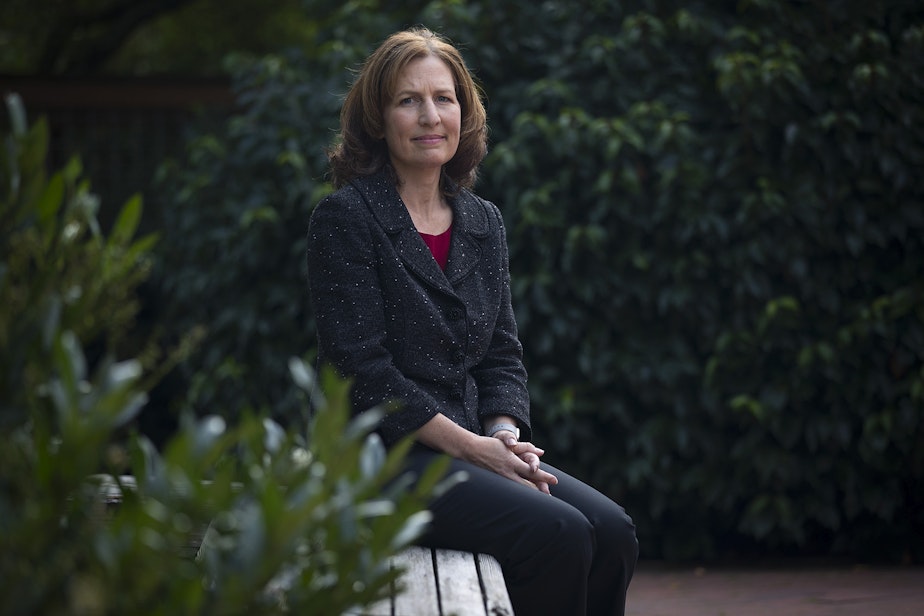Left and right still talk in this district east of Seattle, but what does that mean when their candidate lands in D.C.?

Incumbent Democrat Kim Schrier is being challenged by Republican Jesse Jensen to represent the 8th Congressional District, east of Seattle. Unlike a lot of American politics in 2020, one big theme in the race is bipartisanship.
But what does bipartisanship mean in a hyper-partisan age?
For Issaquah resident Wendy Rogers, it’s personal.
“I’m probably the only conservative person on my block, and I enjoy having polite conversations with my neighbors about that stuff. We all get along,” Rogers said.
Rogers placed her ballot inside the drop box outside Issaquah Town Hall. She supports Republican Jesse Jensen. But she also knows her conservative politics are out of step with many in this community nowadays.
“I don't feel that Issaquah is conservative anymore, at least traditionally conservative the way that I grew up here,” Rogers said.
Issaquah is now a deep shade of blue, particularly when it comes to presidential politics. In 2016, Hillary Clinton got 64% of the vote here compared to Trump's 25%.
Sponsored
The 8th Congressional District has changed, too. It was redrawn after the 2010 census to make it a safer seat for former Republican Congressman Dave Reichert. Today it stretches from mostly bluer cities in the western part of the state to redder places like Chelan across the Cascade Mountains to the east.
As the population has increased and changed, the district turned much more purple. Then in 2018, Kim Schrier became the first Democrat to win out here since the district was created in the early 1980s.
Margaret O’Mara, whose expertise is political history at the University of Washington, said there were more purple districts back in the 1970s and 1980s, and that often led to a different kind of politician, who was more interested in compromise.
“You could get penalized if you were too extreme, one way or the other,” O’Mara said.
Sponsored
O'Mara said that started to break down in the 1990s when Republican Newt Gingrich became speaker of the U.S. House and turned compromise into a dirty word.
Nevertheless, in the 8th District this year, both candidates claim to be passionate proponents of bipartisanship.
Schrier, for example, said she works hard to get to know her congressional colleagues, “on both sides of the aisle."
"I think that when we know each other, when we see the humanity in each other, when we meet each other's families, it is so much easier to build trust, and work together,” she said.
On the issues, Schrier is a moderate Democrat who is much closer to Joe Biden than Bernie Sanders. She also emphasizes that she is the only doctor from Washington's delegation (and the only female doctor in the U.S. Congress), who has the medical profession in common with a number of Republicans in Congress.
Sponsored
Asked for a specific example of bipartisanship, Schrier mentioned a bill she co-sponsored with Republican Michael C. Burgess of Texas to stop the spread of misinformation about vaccines.
“Frankly, as doctors, we see eye-to-eye on several other issues,” Schrier said.

In total, she’s introduced 11 bipartisan bills. But Schrier comes in 288th in Congress in one non-partisan index that measures bipartisanship. That’s a lower score than many of her colleagues from Washington state’s delegation.
As for Schrier’s opponent, Jensen is a former program manager at Amazon and Microsoft, and an Army veteran. He said he's signed a cross-partisan pledge to co-sponsor a Democratic bill once a month and meet with a Democratic member of congress every week.
Sponsored
“One of the first conversations that I hope to have once elected is with Alexandria Ocasio-Cortez, because she is a fantastic role model for my two daughters,” Jensen said.
That sure sounds bipartisan, but how exactly does he see himself working with Democrats?
Jensen points to climate change as an example, emphasizing that he "believes the scientists," which these days is unusual for some Republicans.
But he’s opposed to a carbon tax, which many economists and Democrats including Schrier support.
Jensen mostly favors free-market tech solutions like next-generation nuclear power to replace fossil fuel in the U.S. and in the developing world. (Bill Gates, who co-founded a nuclear power to company to do just that, complains that Trump's trade war with China set the technology back five years).
Sponsored
That brings us to the thorniest of issues for a Republican candidate in a purple district: Jensen plans to vote for President Trump.
“Look, I'm a Republican running for Republican office, I'm going to vote for the Republican nominee," he said. "It's really that simple.”
It may be simple, but a vote for Trump may not sound moderate to many of the Democratic and Independent voters in the 8th this year.




